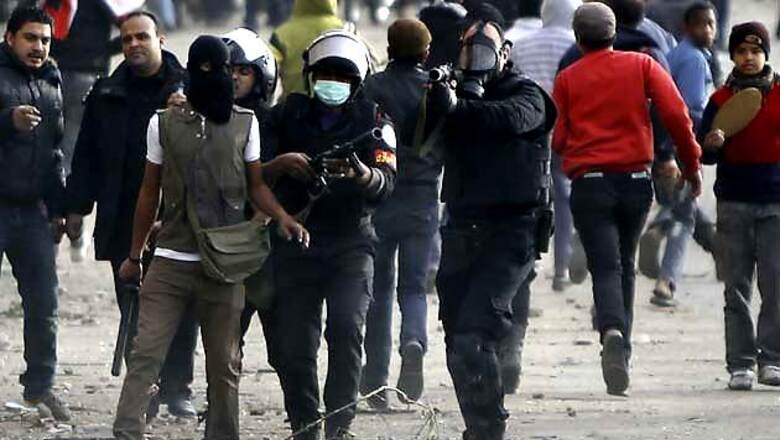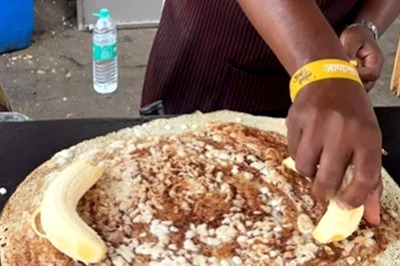
views
Cairo: Egyptian President Mohamed Mursi declared a month-long state of emergency on Sunday in three cities along the Suez Canal which have been the focus of anti-government violence that has killed dozens of people over the past four days. Seven people were shot dead and hundreds were injured in Port Said on Sunday during the funerals of 33 protesters killed at the weekend. A total of 49 people have been killed in demonstrations around the country since Thursday and Mursi's opponents have called for more protests on Monday.
"Down, down Mursi, down down the regime that killed and tortured us!" people in Port Said chanted as the coffins of those killed on Saturday were carried through the streets. In a televised address, Mursi said a nightly curfew would be introduced in Port Said, Ismailia and Suez, starting Monday evening. He also called for dialogue with top politicians. About 200 people protested in Ismailia after the announcement.
"The protection of the nation is the responsibility of everyone. We will confront any threat to its security with force and firmness within the remit of the law," the president said, adding that he offered condolences to families of the victims of those who died in the cities. In Cairo the newly appointed interior minister Mohamed Ibrahim was ejected from the funeral of one of the police officers who died during Saturday's clashes in Port Said, according to witnesses and police sources.
A police officer at the funeral said many of his colleagues blame the interior minister on the deaths of at least two policemen during Saturday's clashes as he did not allow the police there to carry weapons and were only given teargas bombs. State television said seven people died from gunshot wounds on Sunday. Port Said's head of hospitals, Abdel Rahman Farag, told Reuters more than 400 people had suffered from teargas inhalation, while 38 were wounded by gunshots.
Gunshots had killed many of the 33 who died on Saturday when residents went on the rampage after a court sentenced 21 people, mostly from the Mediterranean port, to death for their role in deadly soccer violence at a stadium there last year. A military source said many people in Port Said, which lies next to the increasingly lawless Sinai Peninsula, possess guns because they do not trust the authorities to protect them. However it was not clear who was behind the deaths and injuries.
In Cairo, police fired teargas at dozens at protesters throwing stones and petrol bombs in a fourth day of clashes over what demonstrators there and in other cities say is a power grab by Islamists two years after Hosni Mubarak was overthrown. In Ismaila city, which lies on the Suez Canal between the cities of Suez and Port Said, police also fired teargas at protesters attacking a police station with petrol bombs and stones, according to witnesses and a security source there.
The protesters accuse Mursi, elected in June with the support of his Muslim Brotherhood group, of betraying the democratic goals of the revolution. Most of the deaths since Thursday were in Port Said and Suez, both cities where the army has now been deployed. The violence adds to the daunting task facing Mursi as he tries to fix a beleaguered economy and cool tempers before a parliamentary election expected in the next few months which is supposed to cement Egypt's transition to democracy.
It has exposed a deep rift in the nation. Liberals and other opponents accuse Mursi of failing to deliver on economic promises and say he has not lived up to pledges to represent all Egyptians. His backers say the opposition is seeking to topple Egypt's first freely elected leader by undemocratic means. Heba Morayef of Human Rights Watch in Cairo said a state of emergency reintroduced laws that gave police sweeping powers of arrest "purely because (people) look suspicious".
"It is a classic knee jerk reaction to think the emergency law will help bring security," she said. "It gives so much discretion to the Ministry of Interior that it ends up causing more abuse which in turn causes more anger." The opposition Popular Current and other groups have called for more protests on Monday to mark what was one of the bloodiest days of the 2011 uprising.
"Blood being spilt"
On a bridge close to Tahrir Square, youths hurled stones at police in riot gear who fired teargas to push them back towards the square, the cauldron of the uprising that erupted on January 25, 2011 and toppled Mubarak 18 days later. "None of the revolution's goals have been realised," said Mohamed Sami, a protester in Cairo's Tahrir Square on Sunday.
"Prices are going up. The blood of Egyptians is being spilt in the streets because of neglect and corruption and because the Muslim Brotherhood is ruling Egypt for their own interests." Clashes also erupted in other streets near the square. The US and British embassies, both close to Tahrir, said they were closed for public business on Sunday, normally a working day.
The army, Egypt's interim ruler until Mursi's election, was sent back onto the streets to restore order in Port Said and Suez, which both lie on the Suez canal. In Suez, at least eight people were killed in clashes with police. Many ordinary Egyptians are frustrated by the violence that have hurt the economy and their livelihoods. "They are not revolutionaries protesting," said taxi driver Kamal Hassan, 30, referring to those gathered in Tahrir. "They are thugs destroying the country."
Call for dialogue
The National Defence Council, headed by Mursi, called on Saturday for national dialogue to discuss political differences. That offer has been cautiously welcomed by the opposition National Salvation Front. But the coalition has demanded a clear agenda and guarantees that any agreements will be implemented.
The Front, formed late last year when Mursi provoked protests and violence by expanding his powers and driving through an Islamist-tinged constitution, has threatened to boycott the parliamentary poll and call for more protests if its demands are not met, including for an early presidential vote.
Egypt's transition has been blighted from the outset by political rows and turbulence on the streets that have driven investors out and kept many tourists away. Its currency, the pound, has steadily weakened against the dollar. The Port Said clashes erupted after a judge sentenced 21 men to death for involvement in 74 deaths at a soccer match on February 1, 2012 between Cairo's Al Ahly club and the local al-Masri team. Many of the victims were fans of the visiting team.
There were 73 defendants in the case. Those not sentenced on Saturday will face a verdict on March 9, the judge said. Al Ahly fans cheered the verdict after threatening action if the death penalty was not meted out. But Port Said residents were furious that people from their city were held responsible.















Comments
0 comment